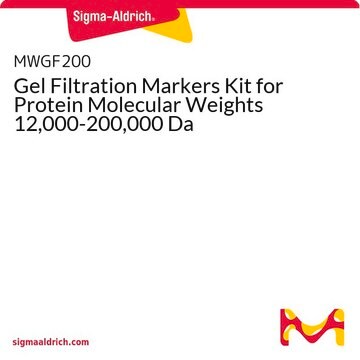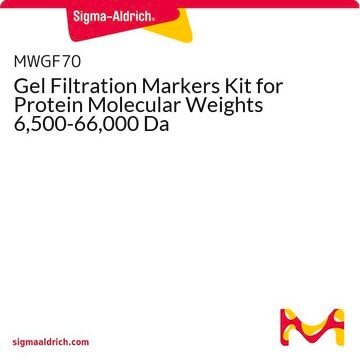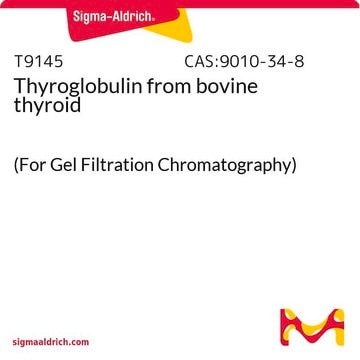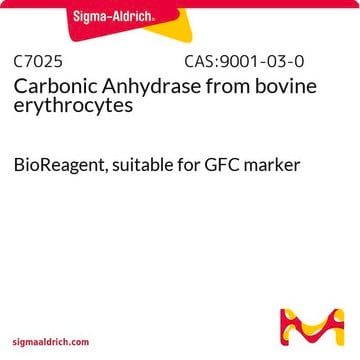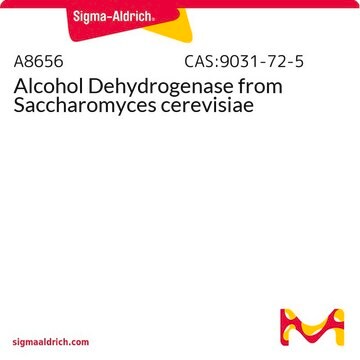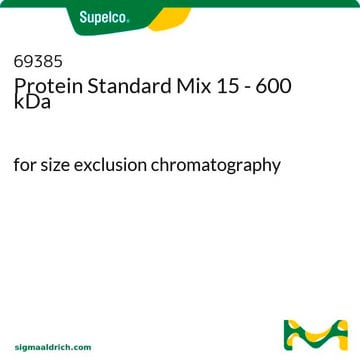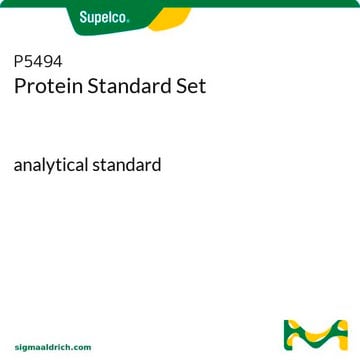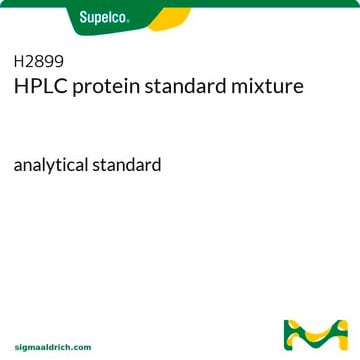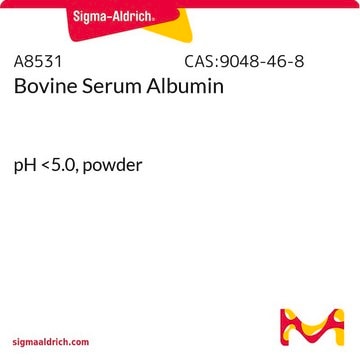MWGF1000
Gel Filtration Markers Kit for Protein Molecular Weights 29,000-700,000 Da
Synonym(s):
Gel Filtration Markers Kit, Gel Filtration Protein Ladder, Protein Molecular Weight Marker Kit
Sign Into View Organizational & Contract Pricing
All Photos(1)
About This Item
UNSPSC Code:
12352200
NACRES:
NA.25
Recommended Products
form
liquid
technique(s)
liquid chromatography (LC): suitable
storage temp.
−20°C
General description
Gel filtration chromatography is a well-known technique for measuring the size and molecular weight of proteins. It separates proteins based on their ability to diffuse into the pores of the resin. Larger proteins have more difficulty entering the resin pores, so they flow through the column more quickly than smaller proteins. As a result, the proteins are eluted from the column in order of decreasing molecular weight.
Application
Gel Filtration Markers Kit for Protein Molecular Weights 29,000-700,000 Da has been used:
- for protein purification and analyses (gel-filtration experiments)
- for size-exclusion chromatography/gel filtration chromatography of synaptoneurosome extract
- for glycerol gradient centrifugation
- to study glucocorticoid-induced lymphocytolysis as a model system for apoptosis within the immune system
- to isolate Polygonatum odoratum lectin, which showed remarkable anti-HSV-II activity towards Vero cells, cytotoxicity towards human melanoma A375 cells and induced apoptosis in a caspase-dependent manner
Biochem/physiol Actions
The method described in the bulletin for determining molecular masses using gel filtration chromatography is a modified version of existing published techniques. The protein standards included in this kit may be compatible with other chromatographic systems like high-performance liquid chromatography (HPLC). However, certain buffer systems may affect the elution volumes of albumin and carbonic anhydrase. The proteins in this kit have a molecular mass range spanning from 29 kDa to 699 kDa.
Other Notes
- For research use only. Not for drug, household, or other uses.
- Please consult the Safety Data Sheet for information regarding hazards and safe handling practices.
- Please refer to the product information sheet to learn more about reagents, storage and stability, and procedure.
Kit Components Also Available Separately
Product No.
Description
SDS
- A8531Albumin, bovine serum, 66,000 MW 1 mL/vialSDS
- A8656Alcohol Dehydrogenase, yeast, 150,000 MW 1 mL/vialSDS
- A8781 β-Amylase, sweet potato, 200,000 MW 1 mL/vialSDS
- A3660 Apoferritin, horse spleen, 443,000 MW 1 mL/vialSDS
- D4772Blue dextran, 2,000,000 MW 1 mL/vialSDS
- C7025Carbonic Anhydrase, bovine erythrocytes, 29,000 MW 1 mL/vialSDS
- T9145Thyroglobulin, bovine, 669,000 MW 1 mL/vialSDS
Signal Word
Danger
Hazard Statements
Precautionary Statements
Hazard Classifications
Resp. Sens. 1
Storage Class Code
10 - Combustible liquids
Flash Point(F)
Not applicable
Flash Point(C)
Not applicable
Certificates of Analysis (COA)
Search for Certificates of Analysis (COA) by entering the products Lot/Batch Number. Lot and Batch Numbers can be found on a product’s label following the words ‘Lot’ or ‘Batch’.
Already Own This Product?
Find documentation for the products that you have recently purchased in the Document Library.
Customers Also Viewed
Qi Zong Lao et al.
FASEB journal : official publication of the Federation of American Societies for Experimental Biology, 24(12), 5013-5023 (2010-08-25)
Voltage-gated calcium channels conduct Ca(2+) ions in response to membrane depolarization. The resulting transient increase in cytoplasmic free calcium concentration is a critical trigger for the initiation of such vital responses as muscle contraction and transcription. L-type Ca(v)1.2 calcium channels
Lei Yue et al.
Nucleic acids research, 48(17), 9589-9605 (2020-08-29)
Transcription termination defines accurate transcript 3'-ends and ensures programmed transcriptomes, making it critical to life. However, transcription termination mechanisms remain largely unknown in Archaea. Here, we reported the physiological significance of the newly identified general transcription termination factor of Archaea
Gel-filtration chromatography
F'ag'ain 'O?C, et al.
Journal of biological and chemical chronicles, 25-33 (2011)
Vanessa Castro-Rodríguez et al.
BMC plant biology, 15, 20-20 (2015-01-23)
Glutamine synthetase (GS; EC: 6.3.1.2, L-glutamate: ammonia ligase ADP-forming) is a key enzyme in ammonium assimilation and metabolism in higher plants. In poplar, the GS family is organized in 4 groups of duplicated genes, 3 of which code for cytosolic
Christoph Kalthoff et al.
The Journal of biological chemistry, 277(10), 8209-8216 (2002-01-05)
Epsin and AP180/CALM are important endocytic accessory proteins that are believed to be involved in the formation of clathrin coats. Both proteins associate with phosphorylated membrane inositol lipids through their epsin N-terminal homology domains and with other components of the
Our team of scientists has experience in all areas of research including Life Science, Material Science, Chemical Synthesis, Chromatography, Analytical and many others.
Contact Technical Service